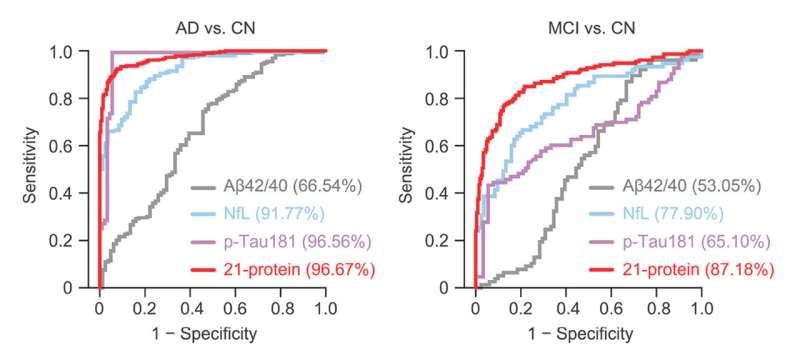This article has been reviewed according to Science X's editorial process and policies. Editors have highlighted the following attributes while ensuring the content's credibility:
fact-checked
trusted source
proofread
Team develops highly accurate universal diagnostic blood test for Alzheimer's disease and mild cognitive impairment

An HKUST-led international research collaboration has achieved a significant milestone in Alzheimer's disease (AD) diagnosis and management. The team has developed a cutting-edge blood test for the early detection of AD and mild cognitive impairment (MCI), surpassing remarkable accuracy rates of over 96% and 87% respectively.
Notably, this blood test is applicable across ethnic populations, providing a global solution to the diagnosis and management of AD. The work was recently published in Alzheimer's & Dementia. The research team was led by Prof. Nancy Ip, President and the Morningside Professor of Life Science at the Hong Kong University of Science and Technology (HKUST), and Director of the Hong Kong Center for Neurodegenerative Diseases (HKCeND).
AD affects more than 50 million people worldwide. A major hallmark of the disease is the accumulation of toxic amyloid beta (Aβ) in the brain, leading to the dysfunction and loss of brain cells, resulting in progressive memory loss, cognitive decline, and difficulties in daily tasks and communication.
The recent approval of the AD drug Lecanemab offers new hope by targeting MCI or mild AD-related dementia with elevated Aβ in the brain. However, the majority of individuals with these conditions are undiagnosed and untreated, largely due to the challenges in making an early diagnosis.
Currently, elevated Aβ can only be measured through costly brain imaging or invasive procedures. Additionally, disease diagnosis heavily relies on clinical observation of symptoms that typically appear 10–20 years after disease onset, by which time the disease has progressed to an advanced stage and is difficult to treat.
Therefore, the development of a simple blood test that accurately identifies individuals with MCI and mild AD, while also detecting elevated Aβ in the brain, would be a game-changer for AD diagnosis and treatment strategies.
Prof. Ip and her team at HKUST have recently developed a blood test for the early detection of AD and MCI with exceptionally high accuracy. In a multinational study involving individuals of Chinese and European descent, the international research team demonstrated the robust performance of the blood test in distinguishing individuals with AD and MCI from cognitively normal people, as well as its ability to detect brain amyloid pathology. These findings also highlight the applicability of the test across diverse ethnic and regional boundaries, showcasing its potential for global impact.
Unlike existing blood assays that mainly focus on a single biomarker analysis to reveal brain pathology, the HKUST-developed blood test simultaneously measures the levels of 21 proteins (as shown in the graphic above), thus revealing the alterations in multiple crucial biological pathways, and achieving more accurate classification of AD and MCI as well as close monitoring of disease progression.
This comprehensive AD profile for each individual opens the door for the future development of tailored treatment approaches for individual patients, known as precision medicine, which can revolutionize the field of AD diagnosis and management.

"Our blood test heralds a new era of simple, effective, and less invasive diagnostics, and by expanding the scope of our research to include diverse populations, we have taken a crucial step towards making our test a universally applicable tool for AD diagnosis," remarked Prof. Ip.
"Our test can also be used to screen suitable individuals for specific drug treatments in clinical studies, and closely monitor disease progression and drug responses. In the future, it may also facilitate the development of personalized treatments, by shedding light on the molecular underpinnings of AD that vary from person to person and between ethnicities."
More information: Yuanbing Jiang et al, A blood‐based multi‐pathway biomarker assay for early detection and staging of Alzheimer's disease across ethnic groups, Alzheimer's & Dementia (2024). DOI: 10.1002/alz.13676



















